Acorns Vs Betterment In 2024 [Minimizing Investment Risks?]
Investing has never been more accessible than it is today, thanks to the rise of online investment platforms. Among the many options available, Acorns and Betterment are two popular choices for investors looking to get started with their investment journey.
Both Acorns and Betterment aim to simplify the investing process and make it accessible to the masses. However, they differ in their investment strategies, fees, and overall user experience. Here, we aim to provide a comprehensive comparison of Acorns vs Betterment, helping you make an informed decision on which platform is right for you.
Skip Ahead
What Is Acorns?
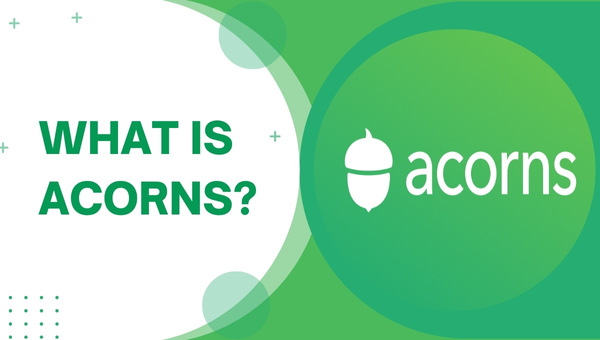
Acorns is a financial technology company that provides a mobile investment application utilizing a modern, robo-advisor approach to simplify the investment process and make it more accessible to the general public.
The app leverages micro-investing, a technique that enables users to invest their spare change by rounding up their everyday purchases to the nearest dollar and investing the difference into a diversified portfolio of Exchange Traded Funds (ETFs).
The app's interface is user-friendly, making it easy for beginners to navigate and start investing. Its portfolio is customizable, allowing users to tailor their investment portfolio based on their investment goals, risk tolerance, and time horizon.
Acorns charges a competitive fee structure, which includes a monthly fee and an asset-based fee, making it a cost-effective investment solution.
What Does Acorns Offer?
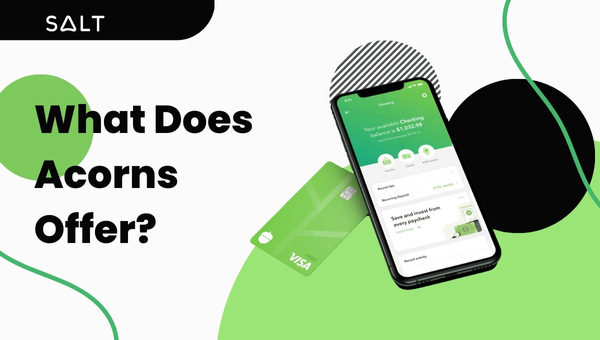
Acorns is a financial technology company that offers a mobile app designed to help users save and invest money. Here are some of the main features and offerings of Acorns:
- Automated Investing: Acorns offers a service that automatically invests the spare change from your everyday purchases by rounding up to the nearest dollar and investing the difference.
- Portfolio Management: There are five portfolio options available through Acorns, each with varying levels of risk and potential rewards. These portfolios are managed by a team of investment experts who routinely rebalance them to maximize returns.
- IRA Accounts: Acorns offers both Traditional and Roth IRA accounts, which allow users to save for retirement with tax benefits.
- Acorns Spend: Acorns has a debit card named Acorns Spend, which you can connect to your Acorns account. By using this card, you can receive cashback on your purchases and decide to invest this cashback back into your Acorns account.
- Financial Education: Acorns provides various educational resources such as articles, videos, and podcasts to help users learn about personal finance and investing.
How To Use Acorns?
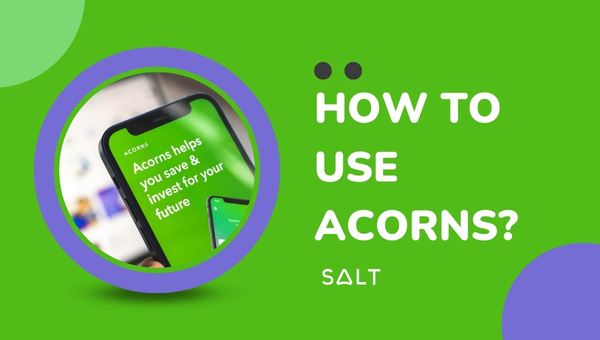
Are you looking for an easy way to start investing and saving money? Acorns is a mobile app that can help you do just that. Here's how you can use Acorns to start growing your wealth and reaching your financial goals.
Download the App
The first step in using Acorns is to download the app from the App Store or Google Play Store. Once you've downloaded the app, create an account and link your bank account to get started.
Choose a Plan
Acorns offers three different subscription plans: Lite, Personal, and Family. The Lite plan costs $1 per month and includes an investment account, while the Personal plan costs $3 per month and includes an investment account, retirement account, and checking account with a debit card.
The Family plan costs $5 per month and includes all of the features of the Personal plan, as well as investment accounts for up to four children. Choose the plan that works best for you based on your investment goals and financial needs.
Set up Round-Ups
One of the unique features of Acorns is the ability to set up round-ups. This means that every time you purchase with your linked debit or credit card, Acorns will round up the total to the nearest dollar and invest the difference in your account.
For example, if you buy a coffee for $2.50, Acorns will round up to $3 and invest the remaining $0.50 in your account. This spare change can add up quickly over time and help you build your savings.
Choose a Portfolio
Acorns offers five different portfolio options, ranging from conservative to aggressive. Each portfolio is made up of a mix of exchange-traded funds (ETFs) that are automatically selected and managed by Acorns' investment team.
Choose the portfolio that matches your risk tolerance and investment goals. You can also change your portfolio at any time if your goals or preferences change.
Set up Recurring Investments
In addition to round-ups, you can also set up recurring investments in your Acorns account. This means that you can choose to invest a certain amount of money regularly, such as weekly or monthly.
Setting up recurring investments can help you stay on track with your savings goals and ensure that you're consistently growing your wealth.
Monitor Your Progress
Finally, it's important to regularly monitor your Acorns account and track your progress toward your investment goals. Acorns make it easy to view your account balance, investment performance, and any fees or charges that you may incur.
By staying on top of your account and making any necessary adjustments, you can ensure that you're maximizing your investment potential and reaching your financial goals.
What Is Betterment?
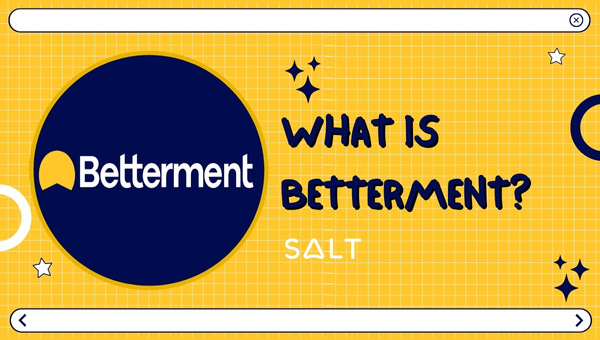
Betterment is a robo-advisor that offers a user-friendly platform for investors to easily manage and optimize their portfolios. It uses a combination of technology and human financial advisors to create and manage portfolios for its users.
Betterment offers a range of portfolio options, including socially responsible investing (SRI) portfolios and tax-efficient strategies like tax-loss harvesting.
With Betterment, users can open taxable investment accounts, traditional and Roth IRA accounts, trust accounts, and 401(k) rollover accounts. Betterment also offers joint accounts, which allow two or more people to share an account and invest together.
Additionally, users can take advantage of Betterment's financial education resources, which include articles, videos, and webinars, to help them make informed investment decisions.
Betterment's fee structure is based on a percentage of assets under management. The platform charges 0.25% per year for its Digital plan, which includes unlimited access to Betterment's robo-advisor and a range of portfolio options.
Betterment also offers a Premium plan for users with more than $100,000 in assets, which includes access to human financial advisors for a fee of 0.40% per year.
What Does Betterment Offer?
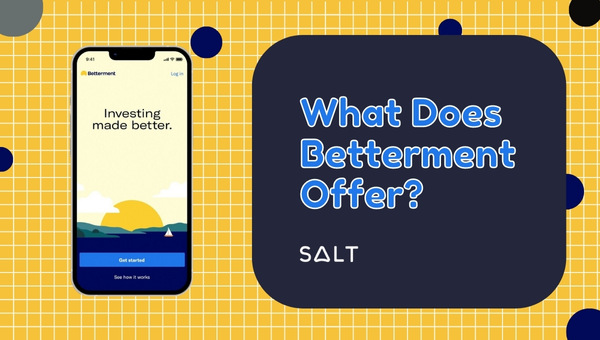
Betterment is an online investment platform that provides users with a suite of features and tools to manage their investment portfolios. Here are some of the key offerings of Betterment:
- Automated Investing: Betterment leverages sophisticated algorithms to create and manage portfolios for users based on their investment goals and risk preferences. Users can choose from a range of portfolio options, including socially responsible investing (SRI) portfolios and tax-efficient strategies like tax-loss harvesting.
- Tax Efficiency: Betterment employs tax-loss harvesting strategies to minimize taxes and optimize investment returns. This feature enables investors to reduce their tax liabilities while maximizing their returns.
- Portfolio Management: Betterment provides users with a range of portfolio options to cater to their different investment goals and risk appetites. Users can select from a variety of portfolios, including SRI portfolios, and adjust their portfolio allocation as required.
- Investment Account Options: Betterment offers a range of investment account options to choose from, such as taxable investment accounts, traditional and Roth IRA accounts, trust accounts, and 401(k) rollover accounts. This broad selection of account types allows investors to choose the account that best fits their needs.
- Financial Education: Betterment provides a variety of educational resources to help users make well-informed investment decisions. These resources include articles, videos, and webinars, as well as access to human financial advisors for users on the Premium plan.
- Transparent Fees: Betterment's fees are transparent and competitive. The platform charges a management fee of 0.25% per year for its Digital plan, which offers users access to Betterment's robo-advisor and a range of portfolio options. The Premium plan, which provides users access to human financial advisors, has a fee of 0.40% per year for investors with assets exceeding $100,000.
How To Use Betterment?
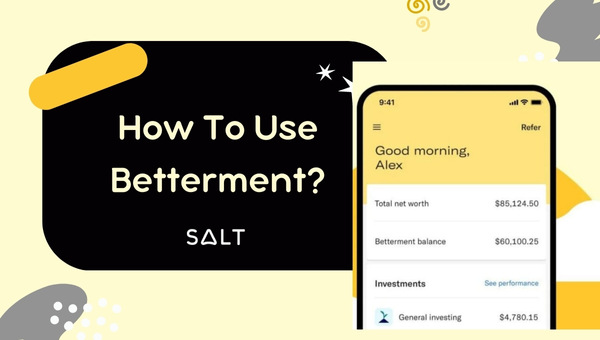
Betterment is an intuitive and easy-to-use platform that provides users with a range of features and tools to manage their investment portfolios. Here's how you can get started with using Betterment:
- Sign up: The first step is to sign up for a Betterment account on their website. The signup process is quick and straightforward, and you will need to provide some basic information about yourself and your financial goals.
- Choose an account type: After signing up, you can select the type of account you want to open. Betterment offers a range of account types, including taxable investment accounts, traditional and Roth IRA accounts, trust accounts, and 401(k) rollover accounts. Select the account type that best suits your needs and investment goals.
- Fund your account: Once you've selected your account type, you can fund your account. Betterment accepts bank transfers, wire transfers, and rollovers from other investment accounts. You can also set up automatic deposits or transfers to ensure that you are consistently contributing to your account.
- Set your investment goals: After funding your account, you will need to set your investment goals. Betterment will ask you a series of questions to determine your risk tolerance and investment preferences. Based on your answers, Betterment will recommend a portfolio that is tailored to your investment goals.
- Manage your portfolio: Once you have set your investment goals, Betterment will take care of the rest. The platform uses algorithms to create and manage portfolios for users based on their investment goals and risk preferences. You can also adjust your portfolio allocation and add or remove investments as needed.
- Monitor your progress: Finally, it's important to regularly monitor your Betterment account and track your progress towards your investment goals. Betterment makes it easy to view your account balance, investment performance, and any fees or charges that you may incur.
Acorns Vs Betterment
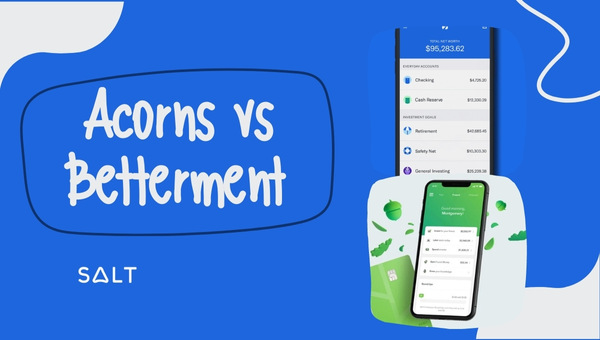
Account Type
Acorns and Betterment are two popular robo-advisors that offer different types of accounts to help investors reach their financial goals. Let's take a closer look at the account types offered by each platform.
Acorns offers three different account types:
- Taxable Investment Accounts: This is the standard account type that is available to all Acorns users. Users can link their bank accounts and credit cards to their Acorns account, and the platform will automatically invest spare change from everyday transactions into a portfolio of ETFs.
- Traditional IRA Accounts: Acorns offers Traditional IRA accounts, which allow users to save for retirement in a tax-advantaged way. Contributions made to a Traditional IRA account are tax-deductible, and users will only pay taxes on the money when they withdraw it in retirement.
- Roth IRA Accounts: Acorns also offers Roth IRA accounts, which allow users to save for retirement with after-tax dollars. Contributions made to a Roth IRA account are not tax-deductible, but users will not have to pay taxes on the money when they withdraw it in retirement.
On the other hand, Betterment offers a wider range of account types:
- Taxable Investment Accounts: This is the standard account type that is available to all Betterment users. Users can link their bank accounts and credit cards to their Betterment account, and the platform will automatically invest their money in a diversified portfolio of ETFs.
- Traditional IRA Accounts: Betterment offers Traditional IRA accounts, which allow users to save for retirement in a tax-advantaged way. Contributions made to a Traditional IRA account are tax-deductible, and users will only pay taxes on the money when they withdraw it in retirement.
- Roth IRA Accounts: Betterment also offers Roth IRA accounts, which allow users to save for retirement with after-tax dollars. Contributions made to a Roth IRA account are not tax-deductible, but users will not have to pay taxes on the money when they withdraw it in retirement.
- Trust Accounts: Betterment offers trust accounts, which allow users to manage investments on behalf of beneficiaries, such as children or family members.
- SEP IRA Accounts: Betterment offers SEP IRA accounts, which are designed for self-employed individuals or small business owners. Contributions made to a SEP IRA account are tax-deductible, and users will only pay taxes on the money when they withdraw it in retirement.
- 401(k) Rollover Accounts: Betterment offers 401(k) rollover accounts, which allow users to transfer money from a previous employer's 401(k) plan into a Betterment account.
Account Minimums
Acorns has no minimum account balance to start investing, but users will need to have at least $5 to begin investing. This low minimum balance requirement makes it easy for investors to start saving and investing without having to meet high minimum investment thresholds.
Betterment, on the other hand, also has no minimum account balance for their digital plan. This means that users can start investing any amount of money they feel comfortable with.
However, their premium plan requires a minimum account balance of $100,000, which is a significant amount and may not be accessible to all investors.
Fees
Acorns has a flat fee structure, which means that users are charged a fixed amount each month based on their chosen plan. Acorns offers three plans:
- Lite Plan: This plan costs $1 per month and includes a taxable investment account, a retirement account, and a checking account with a debit card.
- Personal Plan: This plan costs $3 per month and includes all the features of the Lite plan, plus an option to open an investment account for children.
- Family Plan: This plan costs $5 per month and includes all the features of the Personal plan, plus investment accounts for up to five children and a higher potential investment return.
Betterment, on the other hand, charges a percentage-based fee based on the amount of money invested. The fees charged by Betterment depend on the account type and the amount of money invested:
- Digital Plan: This plan charges a management fee of 0.25% per year and includes a range of features such as automated investing, tax-loss harvesting, and a range of portfolio options.
- Premium Plan: This plan charges a management fee of 0.40% per year for users with more than $100,000 in assets. Users on the Premium plan also have access to human financial advisors.
It's important to note that while Acorns has a flat fee structure, the fees can add up over time and may be more expensive for users with larger account balances. Betterment's percentage-based fee may be more suitable for users with larger account balances, as they will only pay a fee based on the amount of money invested.
Investment Options
Acorns offers five portfolio options made up of ETFs (Exchange-Traded Funds) that are designed to match different levels of risk tolerance and investment goals. Users can choose a portfolio based on their investment objectives and risk tolerance.
Acorns also offers an SRI (Socially Responsible Investing) portfolio option for users who subscribe to the $3 or $5 monthly plans. The SRI portfolio invests in companies that prioritize environmental, social, and governance (ESG) factors.
Betterment offers a wide range of portfolio options, including SRI portfolios and tax-efficient strategies like tax-loss harvesting. Betterment's portfolios are made up of ETFs and are designed to match different levels of risk tolerance and investment goals.
Betterment's SRI portfolio options include a Climate Impact portfolio that invests in companies with low carbon emissions, and a Social Impact portfolio that focuses on companies with high ESG scores.
Both platforms offer automated portfolio rebalancing, which is a strategy that helps investors maintain their desired asset allocation by buying and selling investments when necessary.
Acorns and Betterment both offer automatic portfolio rebalancing, but Betterment takes it a step further by also offering tax-loss harvesting. Tax-loss harvesting is a tax-saving technique that involves selling losing investments to offset gains.
Security
Acorns uses bank-level security to protect its users' information and assets. This includes 256-bit encryption, secure sockets layer (SSL) technology, and two-factor authentication.
Acorns also uses Plaid, a financial technology company that securely links users' bank accounts to their Acorns accounts, to ensure that all transactions are safe and secure.
Betterment also uses bank-level security to protect its users' information and assets. This includes 256-bit encryption, SSL technology, and two-factor authentication. Betterment also uses biometric login options, such as fingerprint recognition and facial recognition, to further enhance security.
Both platforms are also members of the Securities Investor Protection Corporation (SIPC), which provides insurance protection for up to $500,000 of securities and cash held in the event of a broker-dealer's failure.
In addition to these measures, both Acorns and Betterment have comprehensive privacy policies that outline how they collect, use, and protect users' personal and financial information. These policies are regularly reviewed and updated to ensure that they comply with industry standards and regulations.
FAQs Regarding Acorns And Betterment
Which Is Better Acorn Stash Or Betterment?
The decision between Acorns and Betterment depends on your personal investment goals and needs. Consider factors such as account types, account minimums, fees, investment options, customer support, and mobile app features before making a decision.
Can Acorns Make You Money?
Acorns can potentially make you money through their investment portfolios, which are made up of ETFs. However, the specific amount of money you can earn will depend on market conditions and the asset allocation of your chosen portfolio.
How Much Does Acorns Cost Per Month?
The cost of Acorns ranges from $1 to $5 per month, depending on the user's plan. The Lite plan costs $1 per month, the Personal plan costs $3 per month, and the Family plan costs $5 per month.
How Trustworthy Is Betterment?
Betterment is a trustworthy platform that uses bank-level security to protect users' information and assets. They are also members of the SIPC, which provides insurance protection for up to $500,000 of securities and cash held in the event of a broker-dealer's failure.
Conclusion
When it comes to the showdown between Acorns vs Betterment, it's important to remember that the winner depends on your personal investing goals and needs. While both platforms offer robo-advisor services and diverse ETF portfolios, they differ in account types, fees, investment options, and customer support.
For those looking to dip their toes into the investment pool, Acorns may be the perfect fit. With no minimum account balance and low monthly fees, it offers a simple and convenient way to invest.
Betterment, on the other hand, offers a wider range of account types and investment options, making it more suitable for experienced investors looking to maximize their portfolio growth.
Regardless of which platform you choose, it's important to note that both Acorns and Betterment are trustworthy and take security seriously. So whether you're a first-time investor or a seasoned pro, by carefully considering each platform's unique features and benefits, you can make an informed decision and find the robo-advisor that is perfect for you.

Michael Restiano
I support product content strategy for Salt Money. Additionally, I’m helping develop content strategy and processes to deliver quality work for our readers.
